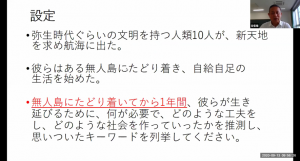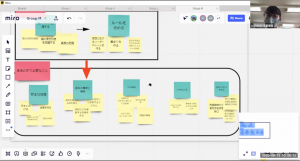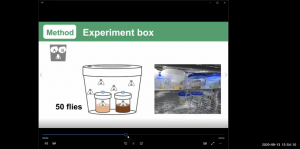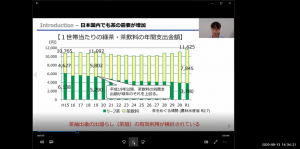2020年9月13日(日)第4回基礎力養成講座を行いました。
今回の講座では、午前中に静岡科学館「る・く・る」の谷俊雄先生によるワークショップ「科学コミニケーション講座」を実施しました。ワークショップは、2つのテーマでグループディスカッションを行いました。
1つ目のテーマは、「無人島にたどり着いてから1年間、生き延びていくには何が必要か – どのような工夫をし、どのような社会を作っていくか -」です。miroを使って討論し、グループの発表では、衣食住を確保する、島の情報を集める、生活のルールを決める、危険から身を守るための道具を作る、薬(薬草など)を見つけるなどの回答が出されました。
2つ目のテーマ「未来のエネルギーをどう使う」では、水素に着目して、水素の生成、運搬、貯蔵、変換、供給、利用の面で考えました。発表では、安全性の面で作成から使用までの時間を早める、インフラ整備のために水素の利点を周知する、コストを下げるために利用度を上げるなどの意見が出ました。
ワークショップ実施後には、「自分には考えられなかったり、表現のできなかった事柄を、miroを通して自分の中の一つの知識として取り入れることができた」、「このテーマ1の議論を通して、やはり人間が生きていく中で必要なことは助け合うことでもあるのかなと改めて理解しなおせた気がする」などの感想が寄せられました。
午後は発展コース生10人の研究の中間発表です。事前に提出した1人5分間の発表動画を基礎力養成コース、発展コースの受講生や先生方、審査員が視聴した後、質問をいただきました。3月の受講生研究発表会が中止になったため研究発表は初めての受講生も多く、かつ、5分間の動画にまとめるのは苦労があったと思いますが、視聴した先生方等からは高いレベルの発表だったとの言葉をいただきました。
基礎力養成コース受講生の感想では、「想像以上にユニークな研究ばかりで、ついていけないものもありましたが面白かった」、「自分とは発想が違う研究、そもそも自分の知らないことについての研究は、良い刺激になりました」、「どのような構成が分かりやすく、どのようなグラフが適切かを、客観的に発表を見たことで理解することができた」、「先生方の質問を聞いていて、研究をする上ではデータの正確性のために様々なことを考慮しなければならないということがわかりました」などの感想が寄せられました。今回の中間発表のアドバイスを受けて、発展コース受講生の研究がさらに深まることを期待します。
終了後にはオンデマンドで配信された「英語表現セミナー」を受講しました。

谷俊雄先生によるテーマ1の説明

Miroのボードで発表する受講生

中間発表動画1

中間発表動画2
オンデマンドで配信された「英語表現セミナー」の質疑応答を下記に転載します。
【 2020/09/13日「英語表現セミナー」の感想・質問・回答 】
———————————————————————-
- [受講生]リスニングで単語なのか単語のつながりで音が変化しているのか聞き分けができません。何かポイントがありますか。
- [講師]There are certain rules but I believe the easiest way to overcome this difficulty is to listen to various contents in English as often as possible. As I mentioned in the videos, how about starting with listening to Nature Podcast (with transcripts) or watching nature video (with captions)? Whenever you are not certain about the contents, confirm with the provided transcripts or captions. Moreover, topics like “how vaccines work” and “how new vaccines are developed” are explained in the latest nature videos. Watching these videos will not only improve your English, but also offer an excellent opportunity to expose yourself to important science topics and newest discoveries. Anyway, the more you are familiar with the language, the easier it gets. So keep learning; keep improving!
- [受講生]英語は学校の教科では得意教科なので、今回の講義を軽視していましたが、受けてみると、知らない単語や使えそうな表現などが多く、とても勉強になりました。英語は言語なので、知る、理解する、暗記するだけでなく、自分で使えるようにしたいと思います。
- [講師]It is a great advantage that you are good at English, just keep in mind to deliver your opinions with precision, clarity, and objectivity, when you use English for scientific communication. I am glad to hear that this lesson gave you some new aspects of English skills. Please do practice these skills in the following discussion sessions at FSS.
- [受講生]論文などの理科的な文章が読みやすくなるための語彙を少しだけでも教えてもらいたい。
- [講師]Scientists report their findings and discuss their hypotheses with precision so there are many professional terms used in scientific papers. It is difficult to give students a list of essential words unless it narrows down to a specific discipline. Nonetheless, verbs used to express research actions and communication actions are universal. Please remember these verbs and practice to use them for your discussion.
- [受講生]質問は特になかった。
- [受講生]Scientific Readingについて、英語の科学誌を読む際にAbstractの構成を意識したり、Research / Communication Actionsを表す単語や表現を意識して読むことを実践したい。
- [講師]I have noticed that students have a tendency to pay more attention to the introduction but less to the main discoveries when they read papers or abstracts. It is understandable because the introduction of a study is usually more informative and interesting, which is particularly helpful for readers who are new to a specific research field. By explaining the structure of an abstract, I wish all of you will be able to notice the significance of any research project right away, when you read abstracts or papers in the future. This is one of the important skills of a scientist because communication with researchers will be more effective and constructive only when you understand the significance of the research they carry out.
- [受講生]特に英語が苦手な私でもわかりやすいセミナー、ありがとうございました。 10/25にある英語のディスカッション前にセミナーを受けることができ、とても良かったです。また、英語でディスカッションする際のポイントや科学論文の書き方などを教えていただき、今後の参考にさせていただこう、と思いました。これから英語を使う際は先生が動画でおっしゃっていた、出来るだけわかりやすい言葉を使うこと、聞き取りやすい発音をすることなどに気をつけてコミュニケーションをとっていきたいです。
- [講師]I am really glad to hear that the lesson was easy enough for you and has provided you a few useful tips for scientific communication in English. Please regularly practice what you’ve learned because these skills will definitely help you communicate with other researchers more confidently and efficiently in the future.
- [受講生]英単語の書きと意味の理解どちらを優先して勉強すべきでしょうか。
- [講師]With all the editing tools available nowadays, knowing how to spell a word seems less and less important. However, knowing the spelling helps you pronounce the word correctly and helps you understand other related words. That is why I believe learning the spelling and the meaning of a new word at the same time is a more efficient way of studying English.
- [受講生]もし、自分が分からない言葉を言う必要があれば、辞書等で調べても良いですか?
- [講師]A dictionary is an indispensable tool for learning a language, particularly for reading and writing. However, when communicating face-to-face with your colleagues, it is unlikely to pause the conversation and check your dictionary. That is why you should engage in a constant effort to enrich your vocabulary. In face-to-face conversations, if you do not have the exact word, please find an alternative word to express your opinion and look into a dictionary afterwards. In addition, as I mentioned in the videos, in order to use English words more accurately, it is better to learn words from English-English dictionaries (after you’ve built sufficient foundation). Here are two online dictionaries I use regularly:
Oxford learner’s dictionaries https://www.oxfordlearnersdictionaries.com
Cambridge dictionary https://dictionary.cambridge.org
Please note that, there are certain differences between American English and British English and you can use whichever you prefer but keep it consistent. - [受講生]そのまま説明を聞いてもわからないことが多く、英語の先生に手伝ってもらった。
- [講師]I am sorry to hear that; glad to know your teacher was there to help, though. However, please do not worry. Joining FSS was a good start. As long as you practice these essential skills frequently, you will soon be good enough and confident enough to conduct serious scientific communication in English. As I mentioned in the videos, to communicate as a scientist efficiently, your English level should be equal to or higher than EiKEN Grade Pre-1. If you haven’t reached this level yet, it will be your immediate goal. Go for it!
- [受講生]私は英語表現セミナーの動画を見て、自分の語彙の少なさを知り、単語を覚え、発音を出来るようにしなければならないという課題を発見しました。次回以降のワークショップで私が足を引っ張らないようにしたいと思います。
- [講師]Thank you for your feedback. This is the exact purpose of the lesson: to guide highly motivated students to prepare themselves for active participation in scientific communication in the future. Knowing your weaknesses and improving them is the most efficient way to prepare yourself. Good luck!
———————————————————————-
![静岡大学[FSS]未来の科学者養成スクール](https://fss.shizuoka.ac.jp/wp-content/uploads/2017/06/edd37c1d5bf1135b06e65144ae37a341.gif)